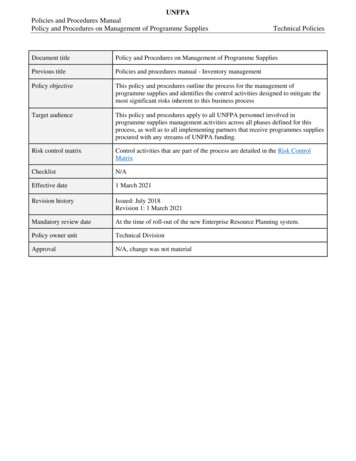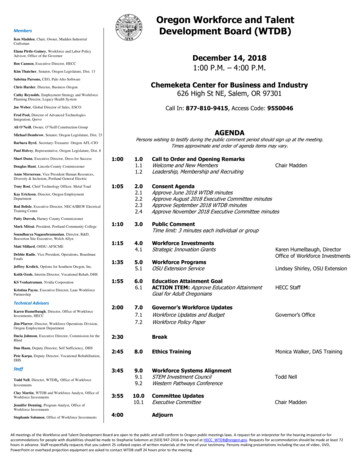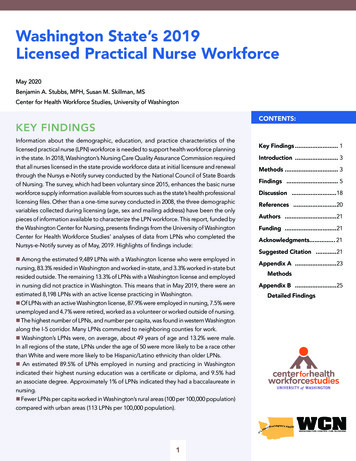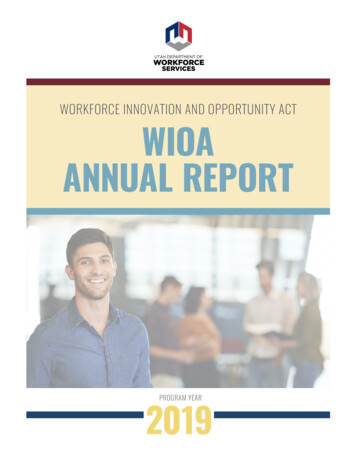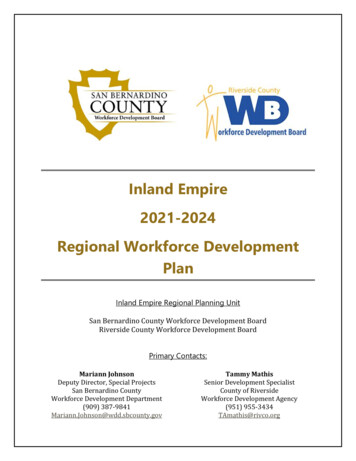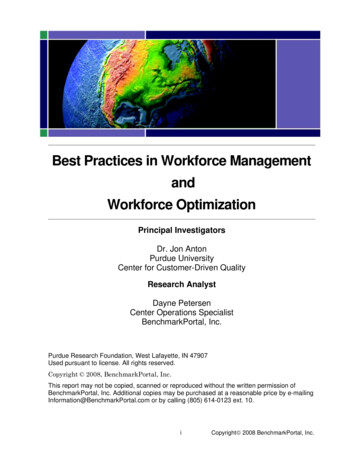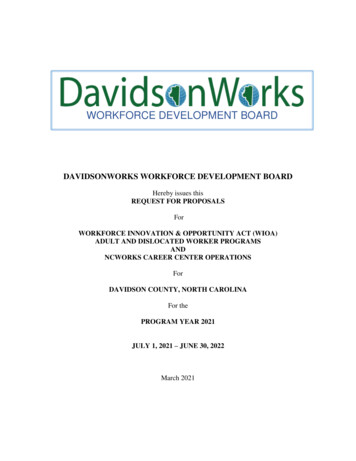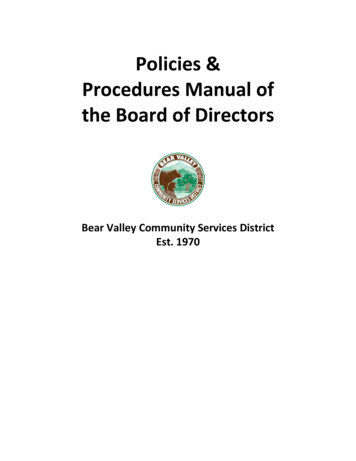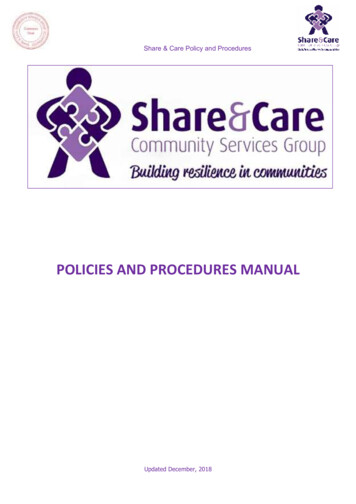
Transcription
Mississippi Community College BoardWorkforce Policy andProcedures Manual2020-2021President’s Approved: February 25, 2020MCCB Board Approved: May 15, 2020Published by:Mississippi Community College BoardDivision of Workforce, Career, & Technical Education3825 Ridgewood RoadJackson, MS 39211Phone: 601-432-6687
In the marketplace today, change is inevitable. Initiating change or the ability to adapt to change is criticalto success. Cultivating a culture which embraces change can be challenging. To address such challenges,it is important to look within our respective organizations to examine current, policies, procedures, andprocess to identify opportunities to improve, align, and lead. The Mississippi Community College Board isin the process of examining its policies, procedures and culture of doing things to identify opportunitiesto become more efficient and effective through change. Oftentimes we fail to recognize the barrierswithin our own organizations which impact the responsiveness and effectiveness of our partners. Throughfeedback and input, MCCB is identifying barriers, instituting solutions and formulating a more responsiveprocess to ensure our partners have the best opportunities for fulfilling their mission at the local and statelevel. I have been asked many times how I can embrace change the way that I do. I can tell you; it is noteasy but I apply the litmus test when deliberating on actions by asking myself the following questions:“Does the change help the student by providing opportunity?”“Does the action help business and industry partners with the resources to be productive?”“Does the action help advance the State of Mississippi?”Doing the right thing for the right reasons is the key to success. Many times, doing the right thing is tolook at yourself first and find opportunities to make changes which positively impact others. Andrea ScottMayfield, Ph.D.Copyright 2020 by Mississippi Community College BoardFor information, please contact 601-432-6518.Rev.2 (1/17/18) Rev.3 2/27/20Note: These guidelines are subject to change over the program year based on additional information that could positively affectinternal procedures. Updates will be emailed and posted at www.mccb.edu1
ContentsOVERVIEW and PURPOSE. 3FINANCIAL . 6CREDENTIALS . 9ACCOUNTABILITY/PERFORMANCE MEASURES. 10TRAINING . 12PROJECT FISCAL POLICIES . 15PROJECT MONITORING & REVIEW. 28APPENDICES . 302
OVERVIEW and PURPOSEThe intent of this manual is to provide governance and guidance in the delivery of workforce services byclearly defining expectations, funding and operating guidelines. The policies represent statements thatembrace alignment of the Workforce Innovation and Opportunity Act (WIOA), the MS Combined StatePlan and the State Workforce Enhancement Training Funds (WET) and define what is acceptable foraccessing WET funds.This manual contains the policies and procedures developed by the Mississippi Community College BoardDivision of Workforce, Career and Technical Education. The FY 2021 policies put forth in this documentinclude and add operational detail to the most recent plans and recommendations for workforcedevelopment, along with policies put in place for funding projects.Mississippi Community College Board’s Workforce Vision StatementThe Mississippi Community College Board is dedicated to supporting both industries and communitycolleges by providing the training and resources necessary to close the middle-skill job gap and increaseworkforce participation rates with a well prepared workforce that supports the current and futureemployment needs of business and industry, and enhances the economic prosperity of Mississippians.Mississippi Community College Board’s Workforce Mission StatementThe purpose of the Mississippi Community College Board’s Workforce Division is to advance the economicwell-being of the state by providing resources to the colleges so they can better serve industries, bridginghuman and economic development.Objectives Examine policies, procedures and industry culture to identify opportunities to become moreefficient and effective through changeInstitute solutions and formulate a more responsive process to ensure our industries/partnershave the best opportunities for fulfilling their mission at the local and state levelAlign the workforce development system with the Mississippi’s Combined State PlanThe Mississippi Community College Board’s RoleThe Mississippi Code of 1972 Annotated §37-153-13 states the MCCB is designated as the primary supportagency to the workforce development centers. The MCCB may exercise the following powers:A. To provide the workforce development centers the assistance necessary to accomplish thepurposes of this chapter;B. To provide the workforce development centers consistent standards and benchmarks to guidedevelopment of the local workforce development system and to provide a means by which theoutcomes of local services can be measured;C. To develop the staff capacity to provide, broker or contract for the provision of technicalassistance to the workforce development centers, including but not limited to:1) Training local staff in methods of recruiting, assessment and career counseling;2) Establishing rigorous and comprehensive local pre-employment training programs,3) Developing local institutional capacity to deliver total quality management training4) Developing local institutional capacity to transfer new technologists into the marketplace3
D.E.F.G.H.I.5) Expanding the Skills Enhancement Program and improving the quality of adult literacyprograms; and6) Developing data for strategic planning;To collaborate with the Mississippi Development Authority and other economic developmentorganizations to increase the community college systems’ economic development potential;To create and maintain an evaluation team that examines which kinds of curricula and programsand what forms of quality control of training are most productive so that the knowledgedeveloped at one (1) institution of education can be transferred to others;To develop internal capacity to provide services and to contract for services from universities andother providers directly to local institutions;To develop and administer an incentive certification program;To develop and hire staff and purchase equipment necessary to accomplish the goals set forth inthis section; andTo collaborate, partner and contract for services with community-based organizations anddisadvantaged businesses in the delivery of workforce training and career information, especiallyto youth, as defined by the federal Workforce Investment Act (now WIOA), and to those adultswho are in low income jobs or whose individual skill levels are so low as to be unable initially tobe aided by a workforce development center. Community-based organizations and disadvantagedbusinesses must meet performance-based certification requirements set by the MCCB.The Local Workforce Development Centers’ RoleThe Mississippi Code of 1972 Annotated §37-153-11 states the local workforce development centers’ roleis:(1) Created workforce development centers are to provide assessment, training and placementservices to individuals needing retraining, training and upgrading for small business and localindustry. Each workforce development center shall be affiliated with a separate public communityor junior college district.(2) Each workforce development center shall be staffed and organized locally by the affiliatedcommunity college. The workforce development center shall serve as staff to the affiliated districtcouncil.(3) Each workforce development center, working in concert with its affiliated district council, shalloffer and arrange services to accomplish the purposes of this chapter.(4) Each workforce development center shall compile and make accessible to the MississippiWorkforce Investment Board necessary information for use in evaluating outcomes of its effortsand in improving the quality of programs at each community college and shall include informationon literacy initiatives. Each workforce development center shall, through an interagencymanagement information system, maintain records on new small businesses, placement, andlength of time on the job after placement and wage rates of those placed in a form containingsuch information as established by the state council.(5) The Mississippi Community College Board is authorized to designate one or more workforcedevelopment centers at the request of affiliated community or junior colleges to provide skillstraining to individuals to enhance their ability to be employed in the motion picture industry inthis state.4
Overview of the Workforce Innovation and Opportunity ActThe Workforce Innovation and Opportunity Act (WIOA) is designed to help job seekers accessemployment, education, training, and support services to succeed in the labor market and to matchemployers with the skilled workers they need to compete in the global economy. WIOA supersedes theWorkforce Investment Act of 1998 and amends the Adult Education and Family Literacy Act, the WagnerPeyser Act, and the Rehabilitation Act of 1973. WIOA is landmark legislation designed to strengthen andimprove our nation's public workforce system and help get Americans, including youth and those withsignificant barriers to employment, into high-quality jobs and careers and help employers hire and retainskilled workers. WIOA represents a renewed commitment to workforce development by focusing onprosperity of workers and businesses, and the economic growth of our communities and state.In November of 2018, the governor submitted the updated WIOA State Plan for Mississippi to theDepartment of Labor (DOL). The DOL approved the plan in 2018. The updated WIOA plan is beingsubmitted March 2020.Objectives of the Mississippi WIOA plan include: Strategic vision among all workforce stakeholders Close the middle-skill job gap Increase workforce participation rates To be a vehicle for economic development by connecting job seekers in real-time with economicopportunities To meet the recruitment needs of current and prospective businessesThe combined plan strategic vision is to create a workforce system that acts and functions as an ecosystemwhere all parts are connected and line up to achieve common goals and wherein every Mississippian hasthe opportunity to be work- or career-ready and to secure his or her dream job right here at home. Fromthe moment one enters the education and workforce system, he or she will be presented with thenecessary tools to choose and pursue a career pathway that is relevant to current and future labormarkets. Similarly, from the moment current and prospective businesses enter into a partnership withMississippi’s education and workforce system, resources will be immediately aligned to cultivate thesustainable, high performance workforce critical for maintaining and expanding businesses’ long-termeconomic viability, in turn creating better and more sustainable employment opportunities forMississippians.
FINANCIAL§ 71-5-353. Rate of contributions; reduction in contribution rate for certain employers; distribution ofcontributions; suspension of Workforce Enhancement Training contributions under certaincircumstances states:(i) Except as otherwise provided for in this subparagraph (i), all monies deposited into the MississippiWorkforce Enhancement Training Fund treasury account shall be utilized exclusively by the MississippiCommunity College Board in accordance with the Workforce Training Act of 1994 (Section 37-153-1 etseq.), policies approved by the Mississippi Community College Board and the annual plan developed bythe State Workforce Investment Board for the following purposes: to provide training at no charge toemployers and employees in order to enhance employee productivity. Such training may be subject to aminimal administrative fee to be paid from the Mississippi Workforce Enhancement Training Fund asestablished by the State Workforce Investment Board subject to the advice of the Mississippi CommunityCollege Board.The initial priority of these funds shall be for the benefit of existing businesses located within the state.Employers may request training for existing employees and/or newly hired employees from the localcommunity colleges who will then submit projects to the Mississippi Community College Board. TheMississippi Community College Board will be responsible for approving the training. A portion of the fundscollected for the Mississippi Workforce Enhancement Training Fund shall be used for the development ofperformance measures to measure the effectiveness of the use of the Mississippi WorkforceEnhancement Training Fund dollars. These performance measures shall be uniform for all communitycolleges and shall be reported to the Governor, Lieutenant Governor and members of the Legislature. TheMississippi Community College Board, individual community or junior colleges and the State WorkforceInvestment Board shall cooperate with each other and with other state agencies to promote effectiveworkforce training in Mississippi. Any subsequent changes to these performance measures shall also bereported to the Governor, Lieutenant Governor and members of the Legislature. A performance reportfor each community college, based upon these measures, shall be submitted annually to the Governor,Lieutenant Governor and members of the Legislature.1. Traditional Funding Projects serving existing workers in existing businesses inclusive of consortium-basedprojects serving multiple businesses, and small businesses. (Within this group, projectsresulting in a credential will receive first priority.) Projects targeted toward training for those businesses and industries previously identifiedas training priorities. Other specialized projects as required.2. New and Expanding Business Funding Projects serving new businesses locating within the state as identified by the MississippiDevelopment Authority, or the local college. Existing businesses within the state that are expanding product lines, expanding facilities,re-starting facilities, and/or adding new employees’ equivalent to 10% or more of thebusinesses current employee base as identified by the local college.6
3. Challenge grants are suspended until funding is available.4. Equipment Funding- Each college will be awarded 100,000 for workforce equipment pendingavailability of funds.5. Collaborative Consortia Grant In an attempt to continue statewide consortia, 1,200,000 of the onetime transfer willbe designated as collaborative consortia grant funding; with 400,000 available for eachconsortium to continue in FY 2021.Enhancement of College Workforce Development CentersThe community college system recognizes the need to continually enhance and improve the availabilityand quality of training at the Workforce Development Centers.(A)Regional/Industry Specific Centers of Excellence – Certain components of workforce developmentcenters can be developed as industry and/or regionally specific Centers of Excellence. Collegeworkforce centers are encouraged to pursue the Centers of Excellence concept for business andindustry under the support of Challenge Grant funding. (Colleges and MCCB will work on criteria.)(B)Professional Development Programs – The MCCB recognizes the need to aid the workforcecenters in developing their staff and instructors in order to maintain the highest quality levels.i.In FY 2021, the MCCB will fund a state-wide professional development program for thecollege workforce divisions, as developed and requested by the Workforce CenterDirectors Association. The association is encouraged to utilize community and juniorcollege facilities and instructors and Mississippi universities for such activities.a.In FY 2021, the MCCB will sponsor quarterly Workforce Center Director meetings.These meetings will rotate across the state at the Workforce Development Centersand will facilitate leveraging community and junior colleges committee’srecommendation of sharing best practices.b. In FY 2021, the MCCB will provide assistance to the colleges in sending workforcetraining staff to statewide meetings such as the Summer CTE/WorkforceDevelopment Conference and/or another workforce training/conference (in-statesuch as the Mississippi Association of College Employers, or Creating Futures ThroughTechnology, or other conferences) that will provide information on best practices orevidence-based research on workforce.In FY 2021, the MCCB will sponsor out of state training for workforce faculty/staff forprofessional development for purposes of support. Colleges shall be reimbursed fortravel cost and 100% of the costs not to exceed 15,000 per college for training eventsattended by college instructors utilized as workforce trainers. These costs will not exceedState rates. For college train-the-trainer requests, make sure the State rate is requestedat hotels, meals are to be reimbursed at the state rate for the area, fares for taxis orairport transportation services in excess of 10.00 require a receipt which must be7
attached to the Travel Voucher to receive reimbursement for that item (the state doesnot reimburse taxi fares for optional travel to and from /TravelManual.docii. MCCB will continue to provide individual technical assistance to all colleges on an as neededbasis. In FY 2021 regional workshops will be held to provide additional technical assistanceand training.(c)Instructional Quality – Based on recommendations by the workforce center directors’instructional quality committee, FY 2021, workforce projects will be required to maintaindocumentation on file that verifies the key components of a quality training course. Appendix Aprovides examples.(d)Marketing/Engagement - Colleges may write projects for marketing the workforce educationcenters. The MCCB Workforce logo must be included on all printed materials.8
CREDENTIALSTrainee CredentialingOne of the components of both WIOA and the MS Combined State Plan is to provide individuals thenecessary training for obtaining an industry recognized credential which will allow skills attainment andskills portability. A credential is issued by a third party with authoritative power and is proof of anindividual’s qualification or competence in a given subject. Possessing a credential not only helps one toprove competency and capability in a given field, but also demonstrates to one’s community andemployers the individual is competent, properly trained and equipped to carry out his or her duties. To sitfor a credential exam, an individual must possess certain requirements — a set level of education,experience or a combination of both. Credentials serve as verification that a professional has achieved abaseline level of competency in his or her subject matter. With credentialed staff members, employersare assured of having a workforce of employees capable of handling whatever challenges their jobresponsibilities present.The MCCB recognizes the importance of trainee credentialing.i. A nationally recognized test that will verify and certify career readiness must be pursued.ii. Any career readiness certificate pursuit must be amenable to the inclusion of career and technicalskills endorsements.iii. Projects resulting in national skills standard or other credentialing and not necessarily serving anexisting worker and/or business. Each college will be allocated up to 10,000 to pursue nationalcredentials.iv. A State of Mississippi industry-recognized credential. This credential must be transferable ormobile within the State. In collaboration with the colleges and constituents the MCCB will developa list of approved credentials. A process will also be developed to approve credentials to add tothe list.Nationally recognized credentials provide third-party verification that individuals have demonstratedcompetence in relevant skill areas. Upon successful issuing of credentials, MCCB will reimburse 50% ofcredential cost. State the total cost of the credential in the project. Reimbursement per person forcredentials shall not exceed 200 per person per year. The maximum reimbursement per college in thiscategory will be 10,000 per fiscal year. Trainee (s) data must be entered into the WESS participant screenand a 0 class must be entered with the student enrolled. Student credentials are required to be trackedin the WESS systemMCCB will NOT pay licensure fees for individuals completing training to include but not limited tocommercial driver license (CDL) testing fee and/or licensure fee, NCLEX registry exam fee and/ornursing license, Certified Nursing Assistant (CNA) exam fees, cosmetology exam or licensure fees,barbering exam or licensure fees, etc. Two primary concerns of all entities involved in workforceeducation in Mississippi are skill attainment and skills portability for trainees.9
ACCOUNTABILITY/PERFORMANCE MEASURES§ 71-5-353. Rate of contributions; reduction in contribution rate for certain employers; distribution ofcontributions; suspension of Workforce Enhancement Training contributions under certaincircumstances states:A portion of the funds collected for the Mississippi Workforce Enhancement Training Fund shall be usedfor the development of performance measures to gauge the effectiveness of the use of the MississippiWorkforce Enhancement Training Fund dollars. These performance measures shall be uniform for allcommunity colleges and shall be reported to the Governor, Lieutenant Governor and members of theLegislature. The Mississippi Community College Board, individual community or junior colleges and theState Workforce Investment Board shall cooperate with each other and with other state agencies topromote effective workforce training in Mississippi. Any subsequent changes to these performancemeasures shall also be reported to the Governor, Lieutenant Governor and members of the Legislature. Aperformance report for each community college, based upon these measures, shall be submitted annuallyto the Governor, Lieutenant Governor and members of the Legislature.The Mississippi Community College Board shall use an accountability system that shall report and describeall classes taught in the area of workforce education, the number of persons taught in these classes, andthe location and cost of each class taught. To assess the impact of these programs, the MississippiCommunity College Board also shall report:(a) Whether the needs of industry have been met through training program offerings (a survey willbe submitted electronically to the industry);(b) Labor market impact and educational attainment.Fiscal Accountability – The MCCB maintains fiscal accountability in two ways: (1) by setting projectwriting and expenditure policies for colleges to follow, and (2) by conducting an annual monitoring visitto each college. Fiscal monitoring visits consist of a review of a college’s projects from the previous year.A variety of checks and balances is referenced, including but not limited to comparing the training plan tothe class roll sheets, comparing reimbursement requests to invoices and instructor time sheets, reviewinginstructional quality checklists and reviewing the notes on instruction as monitored by the center staff.MCCB reserves the right to conduct 100% monitoring visits and the right to monitor any ongoing activitiesat any time at the discretion of the Executive Director of MCCB. In the event discrepancies are found,appropriate corrective action is taken, and the college is provided technical assistance as needed. A copyof the monitoring instrument for FY 2021 projects is provided in Appendix B. (See Monitoring)Programmatic Performance – In FY 2021, the MCCB will continue to have available performanceinformation such as number of employees and employers being served, type and quantity of trainingcourse, and other information that can be determined from the project database. The WESS performancesystem will be used to collect the following:1. the development of a common dataset,2. electronic collection and storage of data, preferably in the local colleges existing studentinformation system,3. electronic systems be able to export information through data files to other entities,10
4. data files are to be used for the purposes of transcripting non-credit activities, MCCB non-creditenrollment management, and for use in determining performance on SWIB/MCCB jointlyapproved performance measures, and5. Appendix D contains the three file structures as the required common dataset that must bemaintained for each training activity.Compliance – Failure to maintain the common dataset for a training project will result in noreimbursement for that project.Performance MeasuresWORKFORCE ACCOUNTABILITY AND PERFORMANCE MEASURESCategoryMeasuresEmployment RateEntered Employment(WET)Employment RetentionRate (WET)DefinitionACCOUNTABILITY MEASURESCalculationData SourceNotesPercentage of participants trained usingWET funds that are employed in thesecond quarter after exit from training.Number of participants employed in the MCCB Workforce Data WIOA Measuresecond quarter after exit from WETMDES Datafunded training/Number of participantsthat exit WET-funded training.Percentage of participants trained usingWET funds that are employed with thesame employer in the second quarter andfourth quarter after exiting from training.Number of participants employed withthe same employer in the second andfourth quarters after exit from WETfunded training/Number of participantsthat exit WET-funded training.MCCB Workforce Data WIOA MeasureMDES DataEarningsLABOR MARKETIMPACTMedian EarningsBusiness PenetrationBusiness RecurrenceActivityEDUCATIONALATTAINMENTCredential RateMedian annualized earnings ofparticipants trained using WET funds thatare employed in the second quarter afterexit from training.Median earnings of participants trainedusing WET funds that are employed inthe second quarter after exit fromtraining/Number of participantsemployed in the second quarter afterexit from WET-funded training X 4(annualized)Number of businesses served using WET Number of businesses served usingfunds in each of the 42 training categories WET funds in each of the 42 trainingcategoriesThe percentage of employers receiving Number of employers receiving WETWET funded training services in a given funded training services in Year 1 andfiscal year that return for additionalYear 2/Number of employers receivingtraining services in the subsequent fiscal WET funded training servcies in Yearyear.1.The percentage of participants trainedThe number of articipants trained usingusing WET funds who obtain aWET funds who obtain a recognizedrecognized postsecondary credential, or postsecondary credential duringwithin 1 year after exit from WET funded training or within 1 year after exit fromtraining.WET funded training/Number ofparticipants that exit WET-fundedtraining.MCCB Workforce Data WIOA MeasureMDES DataMCCB Workforce DataMCCB Workforce Data This measure does not distinguish bythe training category. If a businessreturns in a subsequent fiscal year inany category, they will beconsidered in this measure.MCCB Workforce Data A list of agreed upon credentials willneed to be determined. MCCB andcolleges will develop a list ofworkforce credentials11
TRAININGTraining Priorities§71-5-353 state the WET Fund is for the following purposes: to provide training at no charge to employersand employees in order to enhance employee productivity. (Such training may be subject to a minimaladministrative fee to be paid from the WET Fund as established by the SWIB subject to the advice of theMCCB.) The initial priority of these funds shall be for the benefit of existing employees and/or newly hiredemployees within the state. The MCCB will be responsible for approving the training.The Workforce Enhancement Training (WET) fund, established by the Mississippi Legislature in 2004,provides financial support for community colleges to work collaboratively with state businesses to designand implement specialized short-term training programs to teach the skills that employees need to beproductive and up-to-date in their jobs.Workforce projects that use existing resources of the college are encouraged. In particular, specialconsideration will be given to those projects which share an audience with, compliment, utilize and/orotherwise build upon, strengthen and enhance the colleges’ career and technical education component.Special consideration will also be considered for joint projects between two or more colleges.Meeting industry needs in providing a skilled workforce will require close coordination with employers inlocal markets specifically, the use of current job postings for a real-time view of local demand, which canbe found in MS Works. In-depth discussions with industry executives who a
be aided by a workforce development center. Community-based organizations and disadvantaged businesses must meet performance-based certification requirements set by the MCCB. The Local Workforce Development Centers' Role The Mississippi Code of 1972 Annotated §37-153-11 states the local workforce development centers' role is:
